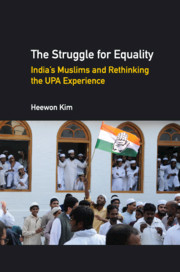Book contents
- Frontmatter
- Dedication
- Contents
- List of Tables and Figures
- List of Abbreviations
- Acknowledgements
- Introduction
- 1 Opening Up the ‘Black Box’ of Public Policy: Towards an Institutional Analysis of India's Policies on Religious Minorities
- 2 Constitution-Making, Equality of Opportunity and Religious Minorities: Reassessing the Critical Juncture
- 3 The UPA in Power: The New Equal Opportunities Framework, Religious Minorities and the Limits of Change
- 4 UPA, Muslims and Public Sector Employment: Assessing the Record
- 5 UPA, Muslims and Service Delivery
- 6 UPA, Muslims and the Communal Violence Bill
- Conclusion
- Appendix Recruitment of minorities in central government departments and public sector undertakings
- Bibliography
- Index
3 - The UPA in Power: The New Equal Opportunities Framework, Religious Minorities and the Limits of Change
Published online by Cambridge University Press: 12 February 2019
- Frontmatter
- Dedication
- Contents
- List of Tables and Figures
- List of Abbreviations
- Acknowledgements
- Introduction
- 1 Opening Up the ‘Black Box’ of Public Policy: Towards an Institutional Analysis of India's Policies on Religious Minorities
- 2 Constitution-Making, Equality of Opportunity and Religious Minorities: Reassessing the Critical Juncture
- 3 The UPA in Power: The New Equal Opportunities Framework, Religious Minorities and the Limits of Change
- 4 UPA, Muslims and Public Sector Employment: Assessing the Record
- 5 UPA, Muslims and Service Delivery
- 6 UPA, Muslims and the Communal Violence Bill
- Conclusion
- Appendix Recruitment of minorities in central government departments and public sector undertakings
- Bibliography
- Index
Summary
Introduction
The formation of a Congress-led UPA government after the Lok Sabha elections in 2004 marked a new contestational juncture in the efforts to establish a more substantive framework of equality of opportunity for India's religious minorities. Against the backdrop of 9/11, the rise of the BJP and Hindutva forces and the failure of the direct assertion of minority rights by ethnoreligious communities from the 1980s to the 2000s, this new approach was distinguished by locating the concerns of religious minorities within national and international discourse on social exclusion. This debate highlighted the need to counter the negative implications of the securitisation of Muslim communities and to tackle their social and economic disadvantage. For the Congress, the change coincided with its reinvention as a social democratic party that was willing to come to terms with coalition governance. The new contestational juncture held the promise of redefining the constitutional settlement by addressing long-term demands of minorities, especially disadvantaged Muslims. Although this development gathered considerable momentum in the first few years of the UPAI's administration, by mid- 2007 the political momentum behind these policies had largely dissipated. Thereafter, the familiar pattern of path dependence reasserted itself.
This chapter provides the background for more detailed case studies of policies on employment, service delivery and security in Chapters 4, 5 and 6. It gives an overview of the UPA's approach to minorities, with special reference to Muslims, by operationalising the framework of institutional policy analysis outlined in Chapter 1, particularly the policy process (agenda-setting, policy formation, decision-making, implementation and evaluation) and the role of key institutions and actors. It first reviews how change in policy occurred before the 2004 general elections. The process of policy formulation is then examined with reference to the SCR and RMCR. Of particular interest are how these reports and associated committees sketched out a new framework of equality of opportunity which promised to transform the foundational settlement. However, institutional and political factors combined to frustrate this outcome, with the consequence that the UPA's decision-making process ultimately produced a partial commitment to new policies that were poorly designed and ineffectually implemented.
Information
- Type
- Chapter
- Information
- The Struggle for EqualityIndia's Muslims and Rethinking the UPA Experience, pp. 65 - 92Publisher: Cambridge University PressPrint publication year: 2019
